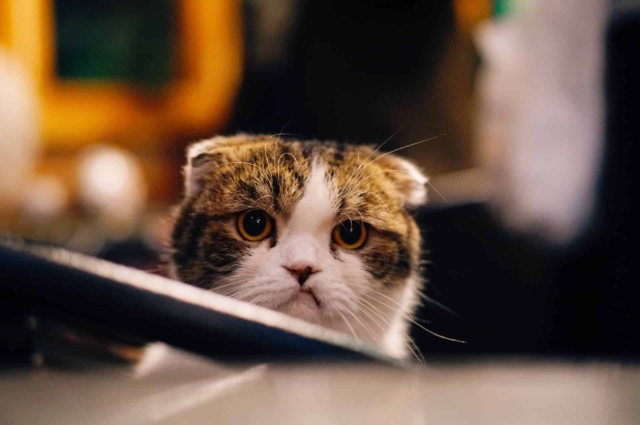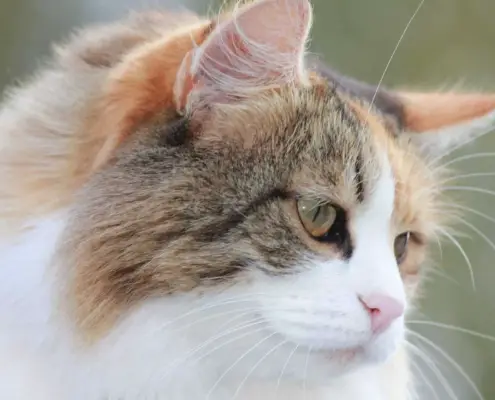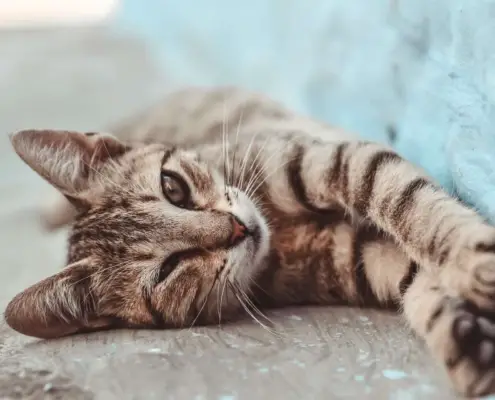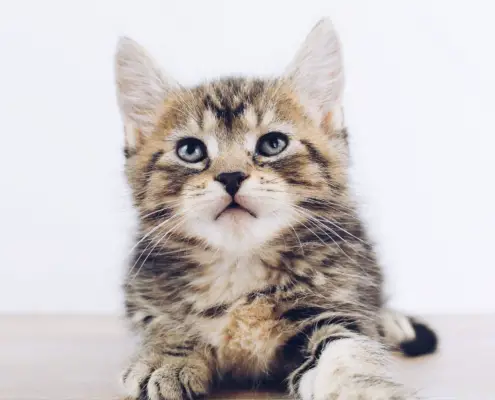
Feline anxiety is a common issue that many cat owners face. Cats, known for their independent and mysterious nature, can experience anxiety due to various triggers. Understanding the causes and signs of feline anxiety is crucial in providing the necessary care and support for our feline friends.
Anxiety in cats can be triggered by various factors, including changes in their environment, social interactions, or even medical issues. It is important to recognize the signs of anxiety in cats, as they may exhibit subtle behaviors that indicate their distress. By delving into the world of cats and their anxiety, we can gain a deeper understanding of their needs and provide them with a safe and anxiety-free environment.
Common Triggers for Feline Anxiety
- Environmental Changes: Cats thrive on routine and familiarity. Any sudden changes in their environment, such as moving to a new house or introducing new pets, can trigger anxiety. Cats may become fearful, exhibit avoidance behaviors, or display aggression when faced with unfamiliar situations.
- Social Interactions: Cats are known for their independent nature, but they still need social interaction. Lack of socialization during their early development stages can lead to anxiety. Additionally, aggressive or intimidating behavior from other pets or humans can cause fear and anxiety in cats.
- Medical Issues: Underlying medical conditions, such as hyperthyroidism or urinary tract infections, can manifest as anxiety in cats. These conditions may cause physical discomfort, leading to behavioral changes and anxiety-like symptoms.
Understanding these common triggers can help cat owners identify the root cause of their cat’s anxiety and take appropriate measures to alleviate their distress.
Understanding Cat Behavior and Body Language
Cats communicate through subtle body language cues and behaviors. By understanding these cues, we can better gauge their emotional state, including signs of anxiety. Some common behaviors that indicate cat anxiety include:
- Changes in Posture: Anxious cats may crouch low to the ground, with their ears flattened against their head. They may also tuck their tail tightly between their legs or puff up their fur, trying to appear larger as a defensive mechanism.
- Excessive Grooming: Cats may resort to excessive grooming when they are anxious. It serves as a self-soothing mechanism, but if it becomes compulsive, it can lead to skin problems and other health issues.
- Avoidance Behaviors: An anxious cat may hide, avoid social interactions, or retreat to a safe space within the house. They may also show signs of aggression when approached or cornered.
By observing these behaviors and understanding their underlying meaning, cat owners can intervene and provide the necessary support to help their cats overcome their anxiety.
Signs of Anxiety in Cats
It is essential for cat owners to recognize the signs of anxiety in their feline companions. Some common signs of anxiety in cats include:
- Excessive Vocalization: An anxious cat may meow excessively, seeking attention and reassurance. Their meows may sound different from their usual communication, indicating distress.
- Changes in Eating Habits: Anxiety can cause cats to lose their appetite or excessively overeat. Look out for any sudden changes in their eating patterns, weight loss, or gain.
- Litter Box Issues: Anxious cats may exhibit inappropriate elimination, urinating or defecating outside their litter box. This behavior is their way of expressing their anxiety and seeking control over their environment.
Recognizing these signs is the first step in addressing feline anxiety and providing a supportive and comforting environment for our cats.
Creating a Safe and Anxiety-Free Environment for Your Cat
Creating a safe and anxiety-free environment is crucial in helping cats overcome their anxiety. Here are some strategies to consider:
- Establish a Routine: Cats thrive on routine and predictability. Stick to a consistent schedule for feeding, playtime, and sleep. This stability can help alleviate anxiety and provide a sense of security for your cat.
- Provide a Safe Haven: Create a designated safe space for your cat, such as a quiet room with their bed, toys, and a litter box. This space allows them to retreat when they feel anxious, providing a sense of security.
- Utilize Pheromone Diffusers: Feline pheromone diffusers, such as Feliway, release synthetic pheromones that mimic a cat’s natural calming scent. These diffusers can help create a calming environment and reduce anxiety in cats.
By implementing these strategies, cat owners can create an environment that promotes their cat’s well-being and reduces stress and anxiety.
Strategies to Help Calm an Anxious Cat
Calming an anxious cat requires patience and understanding. Here are some strategies to help alleviate their anxiety:
- Provide Enrichment Activities: Engage your cat in interactive play sessions using toys that stimulate their natural instincts. This helps redirect their focus and energy, reducing anxiety.
- Positive Reinforcement: Reward your cat’s calm and relaxed behavior with treats or praise. Positive reinforcement encourages desired behaviors and helps build trust and confidence in anxious cats.
- Slow Introductions: When introducing new pets or humans to an anxious cat, take it slow. Gradually expose them to the new stimuli, providing plenty of positive experiences along the way.
Remember, each cat is unique, and what works for one may not work for another. Patience and consistency are key when implementing these strategies.
Seeking Professional Help for Feline Anxiety
In some cases, professional help may be necessary to address severe or persistent anxiety in cats. Veterinary behaviorists or certified animal behavior consultants can provide expert guidance and develop a tailored treatment plan for your anxious cat.
These professionals may recommend behavior modification techniques, medication, or a combination of both to help manage feline anxiety effectively. Consulting with a professional ensures that your cat receives the best possible care and support.
Natural Remedies and Supplements for Cat Anxiety
In addition to professional help, some natural remedies and supplements can help reduce anxiety in cats. However, it is crucial to consult with a veterinarian before using any supplements. Some commonly used natural remedies include:
- Herbal Supplements: Products containing herbs like valerian root can have calming effects on cats. However, their effectiveness may vary, and proper dosages must be followed.
- CBD Products: CBD (cannabidiol) products are gaining popularity for their potential calming effects on cats. It is important to use CBD products specifically formulated for cats and consult with a veterinarian to determine proper dosing.
As with any treatment, natural remedies and supplements should be used under professional guidance to ensure the safety and well-being of your cat.
What Are Cats Terrified Of? Unusual Triggers and Phobias
While cats may have common triggers for anxiety, they can also develop unusual phobias. Some cats may be terrified of:
- Loud Noises: Cats can be extremely sensitive to loud noises such as thunderstorms or fireworks, triggering intense fear and anxiety. Providing a safe hiding place and using noise-cancelling techniques can help alleviate their distress.
- New Objects or People: Cats are naturally wary of unfamiliar objects or people. Introducing new items or individuals slowly, using positive reinforcement, can help cats overcome their fear.
- Travel or Car Rides: Many cats find traveling or car rides stressful. The unfamiliar motion and environment can trigger anxiety. Gradual acclimation to car rides and using calming techniques, such as pheromone sprays or carrier training, can make the experience less frightening for cats.
Understanding these unusual triggers and phobias allows cat owners to address their cats’ fears and provide the necessary support to help them overcome their anxiety.
Final Thoughts
Feline anxiety is a common issue that can significantly impact a cat’s well-being. By understanding the triggers, signs, and behaviors associated with anxiety, cat owners can provide a safe and anxiety-free environment for their feline companions. Implementing strategies such as routine, positive reinforcement, and providing a safe haven can help calm anxious cats. In severe cases, seeking professional help and considering natural remedies under veterinary guidance can be beneficial.
Remember, every cat is unique, and it may take time to find the right approach. With patience, understanding, and a commitment to their well-being, you can help your anxious cat lead a happier and more peaceful life.
If you enjoyed my article, I would appreciate you sharing it with your network.

Sima Ndlebe
Sima writes for CatBuzz. He is interested in Cats, Health and Fitness, and Entrepreneurship.
Published: 5 December 2023
Related Articles
Disclaimer
The content found on CatBuzz.org is presented on an "as is" basis and is intended for general consumer information and education purposes only. Any utilization of this information is voluntary and solely at the user's own risk.
None of the articles or content should be regarded as, or used in place of, veterinary medical advice, diagnosis, or treatment. The information provided on the website is purely for educational and informational intentions and should not be considered a substitute for professional guidance from a veterinarian or other qualified expert. The articles are designed to inform consumers about veterinary healthcare and medical matters that may impact their cat's daily life. It should be noted that this website and its services do not constitute the practice of any form of veterinary medical advice, diagnosis, or treatment. CatBuzz.org explicitly disclaims any liability for any direct or indirect damages or losses that may arise from the use of or reliance on the information contained within the content.
Consumers must consult a veterinarian, veterinary specialist, or another qualified veterinary healthcare provider when seeking advice regarding their cat's health or medical conditions. It is important not to ignore, avoid, or postpone seeking medical advice from a veterinarian or other qualified veterinary healthcare provider solely based on information obtained from this website. If you believe that your cat may be experiencing a medical issue or condition, it is imperative to promptly contact a qualified veterinary healthcare professional.




